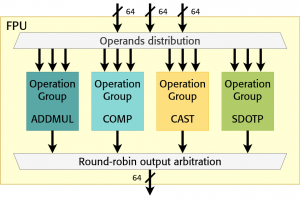Difference between revisions of "Fault-Tolerant Floating-Point Units (M)"
From iis-projects
| (One intermediate revision by the same user not shown) | |||
| Line 9: | Line 9: | ||
[[Category:2023]] | [[Category:2023]] | ||
[[Category:Master Thesis]] | [[Category:Master Thesis]] | ||
| − | [[Category: | + | [[Category:In progress]] |
[[Category:Lbertaccini]] | [[Category:Lbertaccini]] | ||
[[Category:Michaero]] | [[Category:Michaero]] | ||
| Line 15: | Line 15: | ||
= Overview = | = Overview = | ||
| − | == Status: | + | == Status: In Progress == |
* Type: Master Thesis | * Type: Master Thesis | ||
Latest revision as of 14:23, 27 February 2024
Contents
Overview
Status: In Progress
- Type: Master Thesis
- Professor: Prof. Dr. L. Benini
- Supervisors:
Introduction
Fault-tolerant features are crucial in critical and hostile environments (automotive, space, …). In the PULP group, we have started developing reliable hardware designed for use in space, where high levels of radiation have a significant impact on the correctness of executions.
While many processing elements and memory elements have been investigated and protected, fault-tolerant floating-point units (FPUs) still need to be researched. The goal of this project is to enhance the FPU developed at IIS [1] with fault-tolerant features (such as redundancy schemes [2].) For example, a fault-tolerant mode will be investigated, where multiple SIMD units inside the FPU will be used to compute the same operation; the multiple results will then be compared to detect faults.
Character
- 20% Literature / architecture review
- 40% RTL implementation
- 40% Evaluation
Prerequisites
- Strong interest in computer architecture
- Experience with digital design in SystemVerilog as taught in VLSI I
- Experience with ASIC implementation flow (synthesis) as taught in VLSI II
